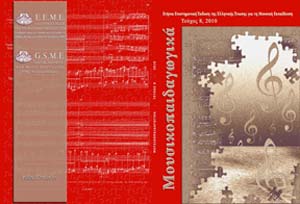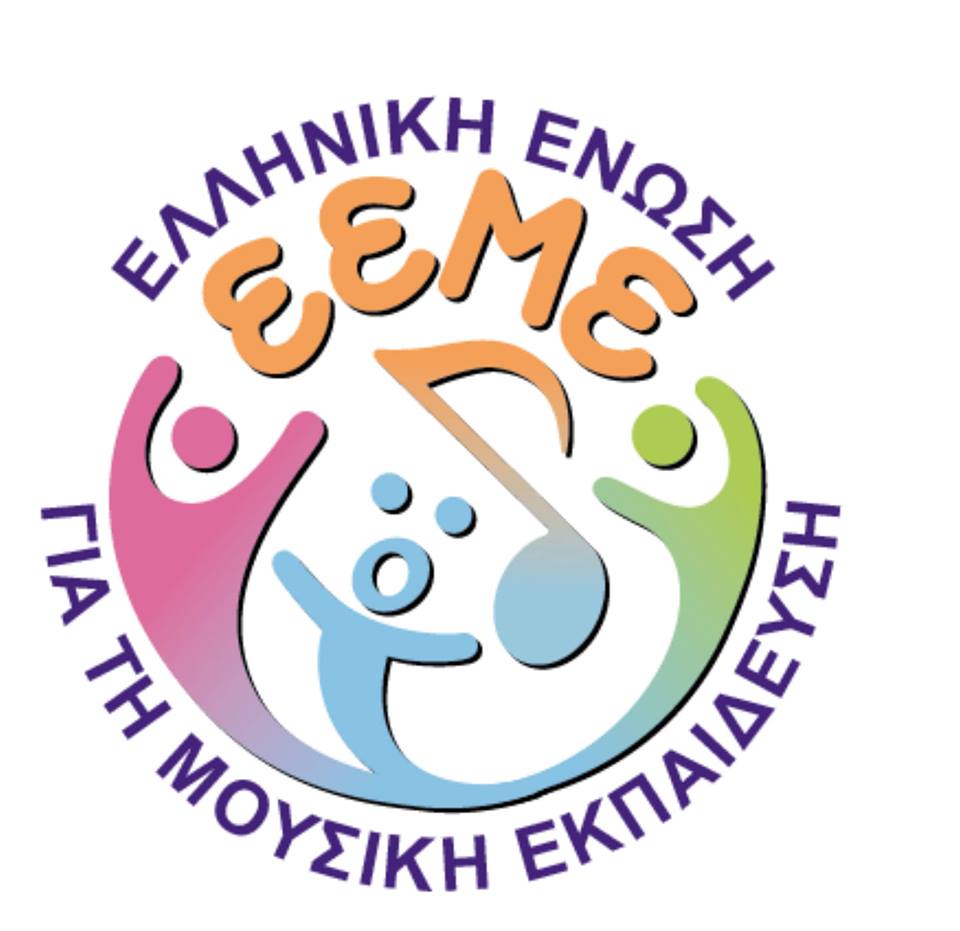
|
Editorial
|
3 |
|
May Kokkidou: Aesthetic Education and Aesthetic Literacy: historic overview and current issues
|
5 |
|
Εirini Nikolaou: Music education in Plato’s Republic
|
26 |
|
Elissavet Perakaki: Teaching Thinking Skills and Music Education
|
42 |
|
Maria Emma Meligopoulou: The school choir in three types of Greek middle schools: public, private and music schools: An empirical research with comparable elements regarding structure, applied methodology, function and other practical issues
|
62 |
|
Konstantinos Dinopoulos: The teaching of music, and particularly Greek traditional music, with the use of new technologies: an experimental research project in elementary education |
94 |
Abstracts:
Aesthetic Education and Aesthetic Literacy:
historic overview and current issues
May Kokkidou
The term «Aesthetic Education» has been used and interpreted in various contexts. It implies, frequently, a type of education in the rules of arts emphasizing in the development of a particular way of students' thinking. In a wider perspective, it is not necessarily considered interwoven with the arts but as a distinct dimension of learning and experience. A third approach raises from the perception of aesthetic as a philosophy of art. Within this approach, aesthetic education includes the study of issues such as techniques, concepts, critic evaluations, values, and expectations regarding artistic creation and the appreciation of works of art.
Several theorists and philosophers (e.g., Schiller, Read, and Dewey) highlighted the importance of Aesthetic and Art Education and stated that Aesthetic Education should be an integral part of every educational system.
In the present paper we discuss the axes of Aesthetic Experience and Aesthetic Literacy while we attempt to illuminate the dimensions of Aesthetic Education, diachronically and synchronically, through the references to movements that dominated the field and through the presentation of controversies of important theoreticians and researchers of the field.
Music education in Plato’s Republic
Εirini Nikolaou
Plato, in his masterpiece Republic, examines the status of music in education and its power in influencing ethos of a human being. Music in Plato, and generally in antiquity, had a broadened sense than it has today, meaning education of all “means” and it included poetry, theatre, art and so on. The sectors of music education in Republic, are: 1. Myths and their right choosing 2. The right way in expressing those myths. 3. The suitable melodies and harmonies, the right rhythms and instruments in educating of youngsters. Through musical education, Plato sees the route to virtues, like wisdom, bravery, temperance, generosity. One can get this kind of education through addiction and exercise and is addressed to the moral and intellectual culture of citizens. Plato’s aspects about music education have influenced the thought of posterior philosophers and educators and render his work current concerning the music education of today.
Teaching Thinking Skills and Music Education
Elissavet Perakaki
During the last decades in the Syllabus and within the educational field in general, the importance of developing critical thinking skills as a means of learning is greatly emphasized. This is in contrast to the knowledge-oriented way of learning implemented until today. The development of criticalthinking skills should be systematic in order to be effective. E. Matsagouras’s Programme on teaching pupils about Critical Thinking emphasizes on the development of critical thinking skills based on Vygotsky’s and Piaget’s theories of learning and development. This Programme has already been implemented in Primary and Secondary Education in Greece and has also been the basis for this particular music lesson research. In this case study research participated 50 pupils from two High Schools in rural areas in Greece, aged 12. The aim of the research was to explore whether acritical thinking development programme could be adapted within a music lesson and develop pupils’ critical thinking skills on music. The results can be summarized that the Critical Teaching Programme can be adapted within music lessons, increasing pupil’s interest on music and enhancing their participatory skills.
The school choir in three types of Greek middle schools: public, private and music schools: An empirical research with comparable elements regarding structure, applied methodology, function and other practical issues
Maria Emma Meligopoulou
The present article is a primary national research among three types of Greek School choirs, - public, private and music middle schools-, which constitute the great majority of Greek type of schools. The research aims to discover the functioning ways of the Greek school choir, the applied teaching strategies, the chosen repertoire, the choirs’ size, the kind of polyphony, the sex’s analogy, the choristers’ age, the schools’ substructure, as well as the level of the scientific accuracy of the teachers in choral education and their own valuation regarding the choral education programs they attended at the Greek universities as students. The results of the research showed that the Greek middle school choir is currently going through a consistent progress and musical grow surrounded by problems that are mainly related with the teachers’ deficiency on teaching the choir, the absence of scientific applied teaching methods, the absence of infrastructure appropriate for the school rehearsal room, the absence of syllabus and handbooks both for the teacher and the student as well as problems that are related with the hour and the length of the choral teaching time.
The teaching of music, and particularly Greek traditional music, with the use of new technologies: an experimental research project in elementary education
Konstantinos Dinopoulos
One of the basic goals of the study was to highlight the usefulness of new informatics and communications technologies in the music education process. To show the benefits that result from this process of teaching-learning with the use of new technologies. To provide a motive to youngmusic educators in Greece, mostly in elementary education, to include new technologies in their daily course load, by providing them with all the information that would render this educational process possible. Starting with the organization of the school informatics lab, the teachers’ role in a technologically enhanced learning environment, and the way in which they can manage the course material through independent and networked multimedia environments. The creation of a “training framework-program for future music educators during their studies at universities, relevant to the teaching of music with the use of new technologies”, which is elaborated to some extent in the proposals of the doctorate dissertation, occurred as a result of all the above.
The implementation of the study required, among other things:
-
Technical equipment (computing and networking hardware) in compliance with determined specifications, which had to be present at the school unit that participated in the study. The existing equipment was enriched with additional material (keyboard music, laptop computer,etc.), thus providing greater capabilities for flexibility, musical expression and creativity.
-
Music educational software (DVD-ROM) relevant to the subject “Greek Traditional Music” (topics: elements and types of Greek traditional music, Byzantine music, etc.), as well as digital musical content available through the Internet (topics: elements of music theory, voice–solfege exercises, midi, etc.; hosted by the educational portal of the Greek Ministry of Education and Religious Affairs, on the website:http://www2.e-yliko.gr/htmls/epimorf/music/default.html).
-
Multimedia environments combining text, music notation, digital sound and images, graphics, video, and midi, enhancing the relationship between the audio and visual representation of music; i.e. seeing, for example, a music interval, a melody, a rhythm, while listening to it at the same time. Necessarily created by the researcher, due to a lack of similar digital material.
Consequently, through the “music system” and particularly through the material and software that was coordinated and produced, the students –through educational activities (seminars – lessons) that were created, and the guidance of the researcher through a new educational role in atechnologically enhanced learning environment – had the opportunity, among other things, to learn-discover music, to experiment and explore, toexpress themselves and to create music in relation to the means of musical expression (body, voice, musical instruments), etc.





 Please wait...
Please wait...